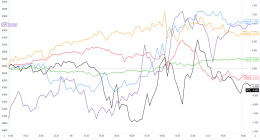
Protecting users and markets aren’t mutually exclusive interests, but they can contradict, said Noah Joshua Phillips, a commissioner at the Federal Trade Commission. Both are desirable goals and must be considered in concert because pushing one may undermine the other, he explained:
“Fundamentally, privacy law is about closing off access to information, right? A person’s information is their own. They control it. You don’t want third parties to use it as much. But competition sometimes relies on assets like information being more widely available.”
The health care industry offers a prime example of the tension between the two principles, Mr. Weiser offered. It should be easy for people to access their own records online, but in practice it’s difficult, despite laws making it possible. Bottlenecks appear in the name of privacy, preventing both access and competition.
On the flip side, promoting competition can also lead to serious privacy invasions, Mr. Stamos said. “The most pro-competitive move Facebook ever made,” he said, led to abuse by a researcher at Cambridge University and the creation of Cambridge Analytica, a company that used the shared information to target content, undermining the integrity of elections in the United States and elsewhere. Acknowledging the conflict between privacy and competition is critical to crafting rules that promote both, he said:
“The first thing we have to do is, we have to admit there’s a tension. And that has to be part of the discussion because the way other folks have done this from a regulatory perspective, they have not considered that tension.”
Mr. Stamos cited Europe’s privacy law as an example of a reform with “massive internal contradictions” around privacy and competition. Ultimately, privacy protections there have only strengthened the giants’ market dominance while adding burdens on small players, thereby limiting competition. This warning was echoed by Mr. Phillips, who said, “Europe has tried to regulate itself into competitiveness. It has not worked, and that is a very important lesson for us to take.”
The counterargument: Barry Lynn of the Open Markets Institute sees privacy and competition on a continuum. By focusing on what companies can do with data and restricting it, the competitive threat they present lessens, he said, so enhancing privacy rights also promotes competition.
Source: | This article originally belongs to Nytimes.com









